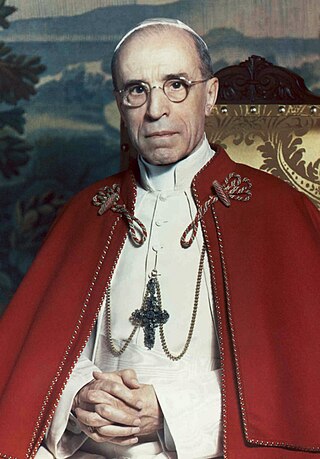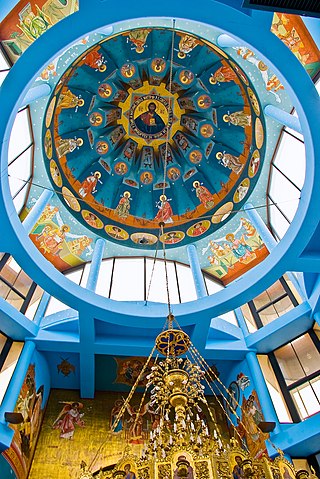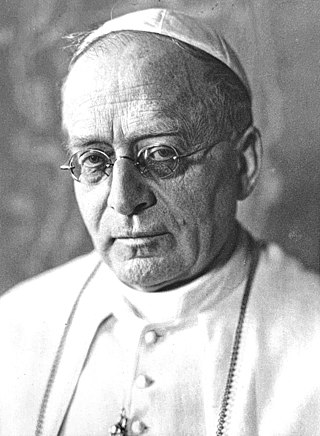
Pope Pius XII was head of the Catholic Church and sovereign of the Vatican City State from 2 March 1939 until his death in October 1958. Before his election to the papacy, he served as secretary of the Department of Extraordinary Ecclesiastical Affairs, papal nuncio to Germany, and Cardinal Secretary of State, in which capacity he worked to conclude treaties with various European and Latin American nations, including the Reichskonkordat treaty with the German Reich.

Pope Pius XI, born Ambrogio Damiano Achille Ratti, was the Bishop of Rome and head of the Catholic Church from 6 February 1922 to 10 February 1939. He also became the first sovereign of the Vatican City State upon its creation as an independent state on 11 February 1929. He remained pope until his death in February 1939.

Mit brennender Sorge is an encyclical of Pope Pius XI, issued during the Nazi era on 10 March 1937. Written in German, not the usual Latin, it was smuggled into Germany for fear of censorship and was read from the pulpits of all German Catholic churches on one of the Church's busiest Sundays, Palm Sunday.
Humani generis unitas was a draft for an encyclical planned by Pope Pius XI before his death on February 10, 1939. The draft text condemned antisemitism, racism and the persecution of Jews. Because it was never issued, it is sometimes referred to as "The Hidden Encyclical" or "The Lost Encyclical". Humani generis unitas was written by three Jesuits under the leadership of John LaFarge. The draft text remained secret until published in 1995 in France and in 1997 in English as The Hidden Encyclical of Pius XI.
The modern history of anticlericalism has often been characterized by deep conflicts between the government and the Catholic Church, sometimes including outright persecution of Catholics in Mexico.
Evangelii praecones was an encyclical letter of Pope Pius XII about Catholic missions. In it, he described necessary improvements and changes, and the persecution of the Church in some parts of the world. The encyclical was issued in commemoration of the 25th anniversary of the encyclical Rerum ecclesiae by his predecessor Pope Pius XI.
Pope Pius XII and Russia describes relations of the Vatican with the Soviet Union, Russia, the Eastern Orthodox Church, and the Eastern Catholic Churches resulting in the eradication of the Church in most parts of the Soviet Union during the Stalinist era. Most persecutions of the Church occurred during the pontificate of Pope Pius XII.
Persecutions against the Catholic Church took place during the papacy of Pope Pius XII (1939–1958). Pius' reign coincided with World War II (1939–1945), followed by the commencement of the Cold War and the accelerating European decolonisation. During his papacy, the Catholic Church faced persecution under Fascist and Communist governments.
Dilectissima Nobis is an encyclical issued by Pope Pius XI on 3 June 1933, in which he decried persecution of the Church in Spain, citing the expropriation of all Church buildings, episcopal residences, parish houses, seminaries and monasteries. He protested "serious offenses committed against the Divine Majesty, with the numerous violations of His sacrosanct rights and with so many transgressions of His laws, We have sent to heaven fervent prayers asking God to pardon the offenses against Him".

Eastern Catholic victims of Soviet persecutions include bishops and others among the tens of thousands of victims of Soviet persecutions from 1918 to approximately 1980, under the state ideology of Marxist–Leninist atheism.

The relations between Pope Pius XI and Judaism during his reign from 1922 to 1939 are generally regarded as good. The pontiff was particularly opposed to antisemitism, an important issue at the time when Nazi Germany was rising. Certain favourable opinions of Pius XI were subsequently used to attack the perceived silence of Pope Pius XII.

Holy See–Soviet Union relations were marked by long-standing ideological disagreements between the Catholic Church and the Soviet Union. The Holy See attempted to enter in a pragmatic dialogue with Soviet leaders during the papacies of John XXIII and Paul VI. In the 1990s, Pope John Paul II's diplomatic policies were cited as one of the principal factors that led to the dissolution of the Soviet Union.
Pope Pius XII's 1942 Christmas address was a speech delivered by Pope Pius XII over Vatican Radio on Christmas 1942. It is notable for its denunciation of the extermination of people on the basis of race, and followed the commencement of the Nazi Final Solution program to exterminate the Jews of Europe. The significance of the denunciation is a matter of scholarly debate.

During the pontificate of Pope Pius XI (1922–1939), the Weimar Republic transitioned into Nazi Germany. In 1933, the ailing President von Hindenburg appointed Adolf Hitler as Chancellor of Germany in a Coalition Cabinet, and the Holy See concluded the Reich concordat treaty with the still nominally functioning Weimar state later that year. Hoping to secure the rights of the Church in Germany, the Church agreed to a requirement that clergy cease to participate in politics. The Hitler regime routinely violated the treaty, and launched a persecution of the Catholic Church in Germany.
The Roman Catholic Church in the 20th century entered into a period of renewal, responding to the challenge of increasing secularization of Western society and persecution resulting from great social unrest and revolutions in several countries. A major event in the period was the Second Vatican Council, which took place between 1962 and 1965. The church instituted reforms, especially in the 1970s after the conclusion of the Council, to modernize practices and positions. On taking office part way through the Council, Pope Paul VI referred to "an impatient struggle for renewal".

Formal diplomatic relations between the Holy See and the current Federal Republic of Germany date to the 1951 and the end of the Allied occupation. Historically the Vatican has carried out foreign relations through nuncios, beginning with the Apostolic Nuncio to Cologne and the Apostolic Nuncio to Austria. Following the dissolution of the Holy Roman Empire and the Congress of Vienna, an Apostolic Nuncio to Bavaria replaced that of Cologne and that mission remained in Munich through several governments. From 1920 the Bavarian mission existed alongside the Apostolic Nuncio to Germany in Berlin, with which it was merged in 1934.
Acerba animi is an encyclical of Pope Pius XI promulgated on 29 September 1932, to denounce the continued persecution of the Catholic Church in Mexico. It was the second of three encyclicals concerning persecution in Mexico, including Iniquis afflictisque (1926) and Firmissimam constantiamque (1937). The Mexican government at the time was engaging in violently anticlerical persecution of the Church, and the Pope harshly criticised the government for its past and current abuse of the Church and its faithful and chided the government for not only violating its promises to the Church made in the recent cessation of the Catholic uprising, the Cristero War, but expanding the persecution.
Events in the year 1930 in Vatican City.
Events in the year 1931 in Vatican City.








